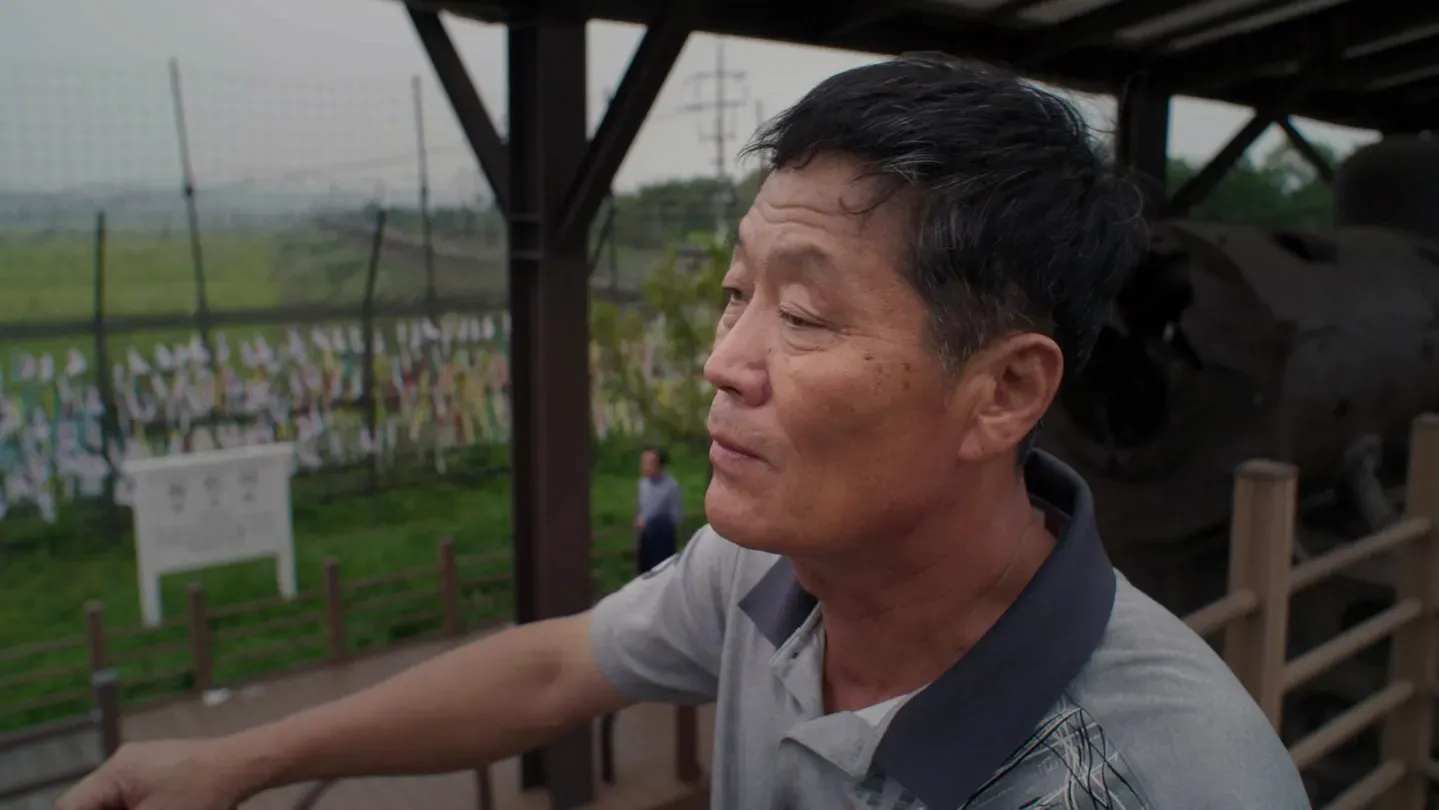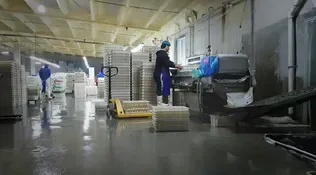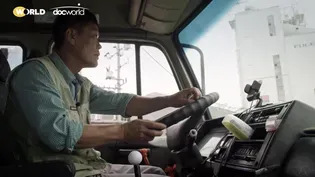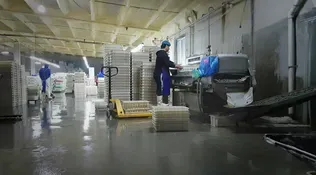

WHY SLAVERY? North Korea's Secret Slaves: Dollar Heroes
Season 4 Episode 12 | 58m 42sVideo has Closed Captions
How does North Korea fulfill their nuclear agenda? By selling their people as laborers.
With the promise of payment and honor, thousands of North Koreans are sent abroad, only to find themselves under constant surveillance and working in harsh conditions - with wages transferred to the government. The film shows how the country and globalization have made a pact: underpaid workers toil for the dictator's nuclear program while the United Nations and the European Union look away.
Funding provided by the Corporation for Public Broadcasting. Additional funding provided by the John D. and Catherine T. MacArthur Foundation and the Wyncote Foundation.

WHY SLAVERY? North Korea's Secret Slaves: Dollar Heroes
Season 4 Episode 12 | 58m 42sVideo has Closed Captions
With the promise of payment and honor, thousands of North Koreans are sent abroad, only to find themselves under constant surveillance and working in harsh conditions - with wages transferred to the government. The film shows how the country and globalization have made a pact: underpaid workers toil for the dictator's nuclear program while the United Nations and the European Union look away.
How to Watch Doc World
Doc World is available to stream on pbs.org and the free PBS App, available on iPhone, Apple TV, Android TV, Android smartphones, Amazon Fire TV, Amazon Fire Tablet, Roku, Samsung Smart TV, and Vizio.
Providing Support for PBS.org
Learn Moreabout PBS online sponsorshipPARK (in Korean): ANNOUNCER: Hundreds of thousands of North Koreans work day and night, secretly, all over the globe.
(speaking non-English language) MAN (in Korean): ANNOUNCER: "North Korea's Secret Slaves: Dollar Heroes," on DocWorld.
♪ (objects clattering, heartbeat) ♪ NARRATOR: North Korea-- one of the poorest countries in the world.
Average earnings here are only a dollar a month.
And yet despite increasingly stringent UN economic sanctions, somehow it's still getting enough foreign exchange to build nuclear weapons and to finance the luxury lifestyle of its elite.
How's this happening?
(phone dialing out) REPORTER (in Korean): INFORMANT: (thunder crackling) NARRATOR: This film gets inside one of the largest and most secretive people trafficking operations in the world.
REMCO BREUKER: North Korea is the biggest illegal job agency in the world.
NARRATOR: The investigation uncovers North Koreans toiling in Russia, China, and even in the European Union.
MAN (in Korean): NARRATOR: Welcome to the hidden world of what North Koreans call "Dollar Heroes."
♪ ♪ NARRATOR: The investigation starts out here in Seoul, South Korea's capital.
30,000 people have managed to flee North Korea.
Many of them live here.
But very few of them are willing to speak about North Korea's overseas work brigades.
They're afraid of what might happen to their relatives still in the north.
Eventually, one person is willing to give the inside track on the system and how it's been going on for decades.
Park was a "Dollar Hero" in the 1980s.
Sent to Siberia by the regime, he was made to drive trucks in a timber camp for seven years.
PARK (in Korean): NARRATOR: The reason Park is willing to talk is because he managed to get his whole family out of North Korea.
He fled in 2005.
His son Yuseong and his wife Soon Geum followed a few years later.
♪ (crickets chirping) YUSEONG: PARK: YUSEONG: PARK: YUSEONG: PARK: (indistinct chatter) ♪ NARRATOR: All this happened to Park some 30 years ago.
How has it changed since then?
One man with insider knowledge was, until recently, a high-level North Korean official.
The interview has to take place in a secret and secure location.
Thae Yong Ho was North Korea's deputy ambassador to London before he fled to Seoul in 2016.
REPORTER: Thae Yong Ho vanished from the North Korean Embassy in London in August.
North Korea is only about 50 miles away from this city, Seoul, Thae Yong Ho's new home.
NARRATOR: For the first time, Thae Yong Ho has agreed to speak about this most sensitive of issues-- how the regime gets much of its foreign exchange.
(chanting, applause) HO (in Korean): ♪ NARRATOR: The whole operation is highly secretive.
Little is known about its scale, how exactly it works, and where it works.
♪ JOURNALIST: Hi!
How are you?
Have you managed to talk to the lawyer?
MAN (on phone): Yes.
She's got three... NARRATOR: Over the course of three years, a team of 20 investigative journalists from Germany, Poland, Russia and South Korea have been trying to get inside the operation and find the answers.
MAN (on phone): But I'll try.
And also apparently there's North Koreans working on... NARRATOR: There are reports that 30 years after Park's ordeal, there are still Dollar Heroes working in Siberia.
♪ So some of the team travel to Blagoveshchensk, a city of around 200,000 on Russia's border with China.
♪ A local Russian human rights organization is in touch with some North Korean construction workers here.
The journalists hope that one of the Dollar Heroes is willing to show them where they're working.
Chinese investments mean that buildings are springing up all over the city.
There's heavy demand for cheap construction labor.
A Korean journalist, part of the team, calls one of the workers.
WON (in Korean): ♪ WON: WORKER (distorted): NARRATOR: The North Korean worker warns that he cannot be seen talking to journalists.
WON: WORKER: (both speaking Korean) WON: WORKER: WON: WORKER: NARRATOR: And not only residential buildings, even entire shopping centers were built by Dollar Heroes.
♪ The next day, the team visits some of the building sites the worker has pointed out.
(machinery buzzing) WON: WORKER: (cellphone ringing) WORKER: (ringing continues) WON: ♪ NARRATOR: It's a sign of just how sensitive this North Korean operation is-- within minutes of talking to a worker, the team is being watched.
And soon after, Russian security agents knock on the team's door.
OFFICER (in Russian): ANDREAS: OFFICER: NARRATOR: The team are told to go with the officers.
♪ WON: So we are in front of the police station, the immigration service people...
They came at about 7:00 in the morning.
And then there were three men-- one policeman and two officers of the UFMS.
And they knocked really loud and...
They took our passports and they wanted to see the record of us.
And they also took our card.
USB... USBs and cards.
So now we're sitting in the car and we're waiting for them now.
♪ NARRATOR: After four hours, the team get their passports back.
They're told it's a routine check, but in truth, it's more likely a warning.
There's no choice but to leave Blagoveshchensk.
But the team's enquiries confirm that the North Korean forced labor system there is very active.
Remco Breuker is a professor of Korean history in the Netherlands.
But for the last few years he's been focusing on North Korea's overseas labor program.
He's now recognized as the world's leading expert on North Korean work brigades.
BREUKER: The dimension is large.
North Korea and Russia, they concluded a new treaty to send more people to Russia.
There used to be many lumberjacks in Siberia but this seems to have gone down.
And what you now find is many people, for example in Vladivostok, which is just a few hours from North Korea, of course, and there are many North Koreans there working in shipyards and in mainly, again, in construction.
♪ NARRATOR: Because of the problems in Blagoveshchensk, the team decides to follow up some leads in Vladivostok, a city of 600,000 close to China and North Korea.
Vladivostok's strategic location makes it an important trading hub.
It's the largest Russian port on the Pacific Ocean.
A new team has a new cover story.
They're investors wanting to buy flats.
They start looking for blocks of apartments under construction where North Koreans could be working.
♪ At one of the sites there's evidence-- a handwritten note about how to pronounce Russian words in Korean.
They decide to investigate.
The Korean team member and his colleagues are wearing hidden cameras.
RYU (in Mandarin): WORKER (in Korean, distorted): RYU (in Korean): WORKER: RYU: ♪ RYU: WORKER (distorted): RYU: NARRATOR: Then, the North Korean captain appears.
FOREMAN: REPORTER: FOREMAN: NARRATOR: The team leaves, so as not to again attract the attention of the Russian authorities.
♪ A local journalist puts them in touch with a North Korean who fled the work brigades some years ago and now lives in hiding.
LEE (in Korean, distorted): NARRATOR: He explains how his work brigade was organized.
LEE: NARRATOR: Early in the morning, after the end of his shift, another North Korean worker secretly talks about how the system works.
WORKER: RYU: WORKER: NARRATOR: According to experts, this suggestion that the so-called "party duty" payment is increasing is almost certainly evidence that tougher UN sanctions are cutting North Korea's legitimate export earnings.
This piles further pressure on the overseas work brigades to send back even more foreign currency.
The nuclear program is clearly increasingly dependent on their forced labor.
♪ 50,000 rubles-- $900 U.S.-- is one-and-a-half times the average monthly wage of a Russian worker.
How can a Dollar Hero make that much money and more?
LEE: NARRATOR: A look on local websites reveals more than 100 North Koreans advertising themselves for work.
STRINGER (in Korean): ♪ NARRATOR: To get a chance to talk to and get to know some North Koreans, the team rents a run-down flat, installs cameras, and hires North Koreans to do some renovation work.
RYU: WORKER (distorted): RYU: WORKER: NARRATOR: While abroad, the North Korean authorities watch their workers very closely.
They house them in barracks under strict surveillance.
♪ While everyone is out for work, the team discovers that the door of one of the barracks has been left open.
(Ryu speaking Korean) (door closes) ♪ Inside the building, it's all North Korea, replete with state propaganda.
♪ ♪ BREUKER: It's exactly the same system with or without the country.
You work your day job because you have to pay the state.
And you can do that through labor or you can do that through money.
And then you have to make sure you and your family survive, because the state can't take care of you.
So you work in the evening, you work in the weekends.
It is the export of the North Korean system abroad.
And it works.
NARRATOR: Experts estimate that there are around 40,000 Dollar Heroes in Russia, making it one of the main destinations for the North Korean overseas forced labor system.
They can be found everywhere: in rural Siberia and in big cities like Moscow and St. Petersburg.
They've even helped build the stadiums for the 2018 football World Cup.
They have no freedom, live under strict surveillance, and have to work literally day and night.
A former high-ranking South Korean government official, Kim Kwang Cheol, has been studying North Korea and its political system for decades.
Few people have better knowledge of how the regime organizes its money flow.
KIM (in Korean): ♪ NARRATOR: China is North Korea's close ally.
Experts estimate that North Korea has more than 100,000 Dollar Heroes working here.
(band music playing) Especially in the Dandong region on the border with North Korea, Chinese manufacturing companies are keen to employ North Koreans because Chinese wages are already too high to remain competitive.
(band continues playing) The demand for North Korean laborers is so great that the Chinese authorities organize work fairs to link up the people behind the North Korean work brigades with Chinese employers.
♪ To learn more about the working conditions of North Koreans in China, one of the undercover journalists poses as a businessman looking for new opportunities.
The owner of a seafood factory agrees to show him around.
The packaging plant is staffed with North Korean women.
The factory owner says that he prefers North Koreans to Chinese workers because the North Koreans cost less and they work harder.
The women live on the premises so they can be put to work anytime day and night.
They sleep in dormitories and are only allowed to leave the premises once a month.
♪ The factory owner explains that their wages are collected by North Korean government officials, who also guard them 24 hours a day.
♪ Believing the team are potential big employers, one of these government officials has agreed to a meeting.
He talks freely.
OFFICIAL (in Korean, distorted): REPORTER (distorted): NARRATOR: China is North Korea's most important trading partner.
It's estimated that in China alone, Dollar Heroes earn hundreds of millions of dollars per year for North Korea's regime with its nuclear ambitions.
Inside North Korea, the applicants are lured into the work program by false promises.
But why don't they escape the horrible conditions once they're abroad?
BREUKER: Before North Korean laborers are selected to go abroad they must pass an ideological test, which mainly consists of a family background check.
So you need to have a family, preferably two children, who remain in North Korea.
So if you... if you would defect, if you would escape, your family would pay the price.
♪ NARRATOR: This system of controlling people abroad has a long history-- as Park can testify.
PARK: NARRATOR: Despite all the dangers, Park decided to flee to South Korea and to leave his family alone in the North.
His son was 15 years old at the time.
Park didn't know whether he would ever see his family again.
It took him another two years to get them to South Korea.
Throughout this time, North Korean authorities put pressure on Park's family.
NARRATOR: North Korea exerts an extraordinary level of control over its citizens.
And because they fear possible consequences for their families, very few members of the overseas work brigades attempt to flee or defect.
And while the vast sums of money these workers earn do little to benefit them or their families, it is of direct benefit to Kim Jong-un and those closest to him.
CHEOL: NARRATOR: While huge funds flow to Kim Jong-un from Russia and China, there's also evidence of an appetite for North Korean forced labor from countries much further west at the heart of the European Union, in Poland.
Suspicions were raised when in August 2014, a North Korean welder died at a shipyard in Gdynia in the North of Poland.
Remco Breuker has obtained the official report into the accident.
BREUKER: He was there alone.
You should never be alone in those circumstances, there's, there needs to be somebody to help you, especially in a case like this.
He was set afire and his clothes lit like a Christmas tree.
And he came stumbling out as a human torch.
His co-workers tried to douse the fire, put out the fire.
They couldn't.
He was taken to the hospital with 95 percent of his body burned, then he died.
NARRATOR: Was this a one-off, or could this accident point to a larger scheme using North Korean labor?
And if so, is it still going on?
The investigation shifts to Poland, where a member of the team manages to get in touch with a North Korean shipyard worker.
He had to move from Gdynia to another city as a result of the report into the accident being made public.
REPORTER (in Korean): INFORMER (in Korean): ♪ NARRATOR: Szczecin in the Northwest of Poland, close to Germany, is the other center of the country's shipbuilding industry.
Polish shipyards are fighting to survive in a globalized market, where pressure on wages is relentless.
The North Korean laborer says that many of the work brigades were moved from the Gdynia region to here.
♪ At Szczecin's commercial register, certificates of registration for every company in the area are openly available.
Could it be possible to find out which companies employ North Koreans?
One company stands out: Redshield.
Its chairman has a Korean name: Pak Jong Ho.
According to other documents obtained via the Labour Inspectorate, Redshield contracts welders for the shipbuilding industry.
They're offered the minimum wage of 2,000 zloty per month, around $600.
Redshield's certificate of registration has its company headquarters at Stolczynska 100D in Szczecin.
(birds chirping) ♪ But it turns out to be a decrepit building, a former school.
Totally empty.
♪ The team decides to ask some locals if they know anything.
REPORTER (speaking Polish): PEDESTRIAN (speaking Polish): REPORTER: PEDESTRIAN: (laughter) REPORTER: PEDESTRIAN: REPORTER: PEDESTRIAN: REPORTER: ♪ NARRATOR: So there are indeed North Koreans working in this area.
Not far away is a big shipbuilding facility, the Partner shipyard.
According to their website, they specialize in shipbuilding and repair.
If Redshield rents out North Korean welders to the shipbuilding industry, it's likely that at least some of them work here.
(distant machinery buzzing) To find out more, the team needs to get inside the shipyard.
(rustling) The journalists decide to pose as representatives of a recruitment agency working with German shipping companies.
The cover story is that their shipping company clients are looking to outsource labor-intensive ship repair work to Poland.
At the main gate of the Partner shipyard, the team meets a security guard who is open and friendly.
REPORTER (in Polish): SECURITY GUARD (in Polish): REPORTER: SECURITY GUARD: REPORTER: FOREMAN: REPORTER: (indistinct chatter) FOREMAN (in Korean): MANAGER (in Korean): FOREMAN (in Polish): REPORTER: FOREMAN: REPORTER: FOREMAN (in Korean): REPORTER: MANAGER (in Korean): FOREMAN (in Polish): SECURITY GUARD: NARRATOR: Then the manager hands over his business card.
REPORTER: NARRATOR: It's Redshield's North Korean chairman, Pak Jong Ho.
From all the information gathered so far, it's clear that North Koreans are running their own registered company in Sczecin.
They employ dozens of workers, and it all seems totally legal.
THAE YONG HO (in Korean): NARRATOR: Right in the heart of Europe, there's clearly complicity between the Polish and the North Korean governments, despite E.U.
and U.N. sanctions.
The North Korean Embassy refuses to answer questions.
The Polish Labour Ministry, too, rejects any interview requests.
However, in a statement they say that 1,034 work permits have been issued to Koreans since 2015, all in accordance with Polish law.
♪ The Polish Ministry of Foreign Affairs responds to the accusation that the North Koreans work under conditions of forced labor, by saying that checks are regularly carried out.
And, "The controls did not confirm that possible violations "of the working conditions of North Korean workers could be considered as forced labor."
The insistence of the Polish government that there is nothing wrong is the insistence of a government that either doesn't know what's going on, or chooses not to know what's going on in their own backyard.
It's quite clear that the employment of North Koreans in Poland is a case of exploitation and if it, if you'd ask me, it's a case of contemporary slavery.
These are people who have nowhere else to go, who can't quit their jobs, who can't say no to anything that's asked of them.
And they don't get paid for it.
NARRATOR: Soon after, the team gets an opportunity to understand just how bleak life is for these North Korean workers.
They make contact again with the shipyard worker who had to leave Gdynia.
REPORTER (in Korean): INFORMER (in Korean): REPORTER: INFORMER: INFORMER: REPORTER: INFORMER: NARRATOR: A couple of days later, the team contacts Redshield's North Korean foreman to set up a meeting with his main clients, the managers of the Partner shipyard.
REPORTER (in Polish): FOREMAN (over phone in Polish): REPORTER: FOREMAN: (rocket igniting) NARRATOR: In August and September 2017, North Korea conducted several missile tests that showed that the country was now capable of targeting the U.S. mainland.
♪ NARRATOR: This deepening hostility between the United States and North Korea threatens to disrupt the supply of low cost labor that the Polish shipyard relies on.
The team has arranged to meet one of the company's senior managers.
REPORTER: MANAGER: MANAGER (in Polish): NARRATOR: The manager offers to show the team around the shipyard.
MANAGER: MALE REPORTER (in Polish): MANAGER: MALE REPORTER: MANAGER: (car door shuts) MALE REPORTER: MANAGER: REPORTER: MANAGER: MALE REPORTER: FEMALE REPORTER: FEMALE REPORTER: FEMALE REPORTER: MANAGER: MALE REPORTER: MANAGER: (laughter) FEMALE REPORTER: ♪ NARRATOR: The United Nations body monitoring the sanctions against North Korea is based in New York.
So far the U.N. has not stopped Poland from using the North Korean work brigades.
The panel's still investigating the Poland case, and we haven't received all the information we need from the Polish authorities to determine whether how far sanctions, if they have been, have been violated.
For example, you need to follow the money, and we need to get answers from Poland as to how the money is transferred.
NARRATOR: There are no verified figures, but U.N. estimates suggest that North Korea's Dollar Heroes earn more than one billion dollars per year.
So how does this money find its way back to Pyongyang?
THAE YONG HO (in Korean): ♪ (indistinct chatter) NARRATOR: Remco Breuker has come to New York to meet an investigator who has inside knowledge about North Korea's money flow.
Cameras are not allowed in this meeting, but the next morning he explains what he's learned.
What happens is that overseas, the money is changed into American dollars, into bills, cash money, and then a diplomat takes the money in the diplomatic pouch to Pyongyang, through Beijing, usually, and this is important because a diplomat has diplomatic immunity, he travels on a diplomatic passport, which means he or she cannot be stopped at a national border, usually at least.
It's a relatively safe way of transferring large sums of money back to Pyongyang.
♪ NARRATOR: With the average salary in North Korea so low, one billion dollars or thereabouts can go a long way.
But what exactly does the regime need foreign currency for?
CHEOL (in Korean): NARRATOR: Even in the most recent round of sanctions late last year, the U.N. security council has not outright banned North Korea's use of overseas work brigades to bring in foreign exchange, despite some harsh language.
NIKKI HALEY: The price the North Korean leadership will pay for its continued nuclear and missile development, will be the loss of one-third of its exports and hard currency.
This is the most stringent set of sanctions on any country in a generation.
NARRATOR: Under the terms of these sanctions, the North Korean government will still be permitted to keep its Dollar Heroes abroad for another two years.
NARRATOR: Why is the U.N. Security Council so hesitant to put an immediate stop to North Korea's overseas work program?
BREUKER: Well, I think there are two reasons-- Russia and China.
And those are, coincidentally-- or not so coincidentally-- also the two largest hosts of North Korean workers, so they make lots of money by using these North Korean workers.
Both, both states are loathe, I think, to let this go.
If you sanction forced labor, if you really sanction it, both China and Russia would have to put a stop to what's going on; neither of those states want that, that's very clear.
♪ NARRATOR: Back in Poland, there's what might be a final opportunity to meet with the senior management of the Partner shipyard.
How can they justify employing North Koreans who are being used and controlled by the regime?
They are unapologetic.
MANAGER (in Polish): ♪ NARRATOR: Unchecked by the international community, North Korea continues to send work brigades all over the world about 150,000 Dollar Heroes in all.
China has around 100,000.
Russia around 40,000.
And there's evidence of North Koreans working in Africa, in Cambodia, in Malaysia, Mongolia, Kuwait, Qatar, the United Arab Emirates, Oman, and Myanmar, as well as Poland.
BREUKER: This is not something that is just concocted by evil men in North Korea and Poland.
If we wouldn't buy clothes made by North Koreans, and we would have to pay higher wages, and even a Chinese laborer earns more than a North Korean laborer, we would feel it in our wallets.
We would have to pay more for the clothes you and I are probably wearing at this very moment.
♪ NARRATOR: North Korean work brigades earn the regime upwards of $1 billion a year.
And with a time limit of two years due to U.N. sanctions, there are predictions that Kim Jong-un will be looking to increase both the number of forced laborers he sends overseas, and to ratchet up the pressure on them to produce even more foreign exchange.
And with the drive for ever-lower wages, the rest of the world is complicit in helping him fulfil his ambitions.
♪ ♪ ♪ ♪
WHY SLAVERY? N. Korea's Secret Slaves: Dollar Heroes | Duty
Video has Closed Captions
The salary of North Korean laborers is paid to the government, leading them to debt. (46s)
WHY SLAVERY? N. Korea's Secret Slaves: Dollar Heroes | Gov't
Video has Closed Captions
A North Korean defector shares his labor experience, and feelings towards the government. (1m 18s)
WHY SLAVERY? N. Korea's Secret Slaves: Dollar Heroes | High$
Video has Closed Captions
A North Korean laborer reveals the personal sacrifices he makes as forced labor. (59s)
WHY SLAVERY? N. Korea's Secret Slaves: Dollar Heroes | Promo
Video has Closed Captions
How does North Korea fulfill their nuclear agenda? By selling their people as laborers. (30s)
WHY SLAVERY? N. Korea's Secret Slaves: Dollar Heroes|Trailer
Video has Closed Captions
How does North Korea fulfill their nuclear agenda? By selling their people as laborers. (1m 18s)
Providing Support for PBS.org
Learn Moreabout PBS online sponsorshipFunding provided by the Corporation for Public Broadcasting. Additional funding provided by the John D. and Catherine T. MacArthur Foundation and the Wyncote Foundation.



















